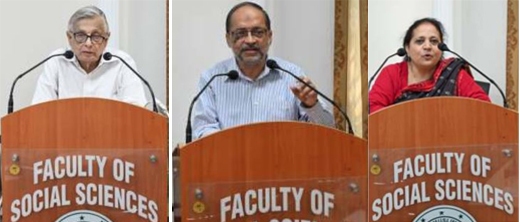International Seminar on ‘The Recent Trends in Indian Archaeology’ Held
Aligarh : “Archaeology is not merely the study of antiquity but also a science that originated during the renaissance in Western Europe and later came to India during the colonial period”, said Prof. Irfan Habib, Professor Emeritus at the Centre of Advanced Study, Department of History, Aligarh Muslim University (AMU), while delivering the keynote address in the inaugural session of the two-day international seminar on “The Recent Trends in Indian Archaeology”, organised by the Department of History, AMU.
Prof Habib discussed the evolution and major achievements of archaeology, and underscored the importance of integrity and honesty as essential virtues for students of archaeology, urging them to maintain these values in their pursuits.
Prof. Asmer Beg, Dean, Faculty of the Social Science at AMU, spoke about the politicization of academia and stressed the importance of integrity in the field of archaeology. He emphasized the need for consistency between teachings and actions.
Prof. Arif Nazir, Dean, Faculty of Arts, a special invitee, emphasized the importance of studying archaeology logically, underlining the need for a logical approach to archaeological research.
Prof. Seema Bawa, Chairperson of the Department of History and Dean, Faculty of Social Science at Delhi University, delivered her paper titled “Fragments of Materiality: Terracotta Figures from the Yamuna Valley.” Her presentation offered insightful case studies, examining terracotta artifacts and sculptures from diverse regions of India during the early historic period. Bawa’s research highlighted the significance of these artifacts in terms of style, materiality, and cultural context, emphasizing India’s rich history of cultural exchange and artistic production.
Dr. Swapna Liddle, Advisor, INTACH, Delhi, presented her talk on “Shahjahanabad – Mapping the Archaeology of a Living Site.” She addressed the challenges of managing archaeological sites that continue to be inhabited, using Shahjahanabad (modern Delhi) as a case study. She underscored the need for better preservation strategies for such historical and cultural sites.
Earlier, Prof. Gulfishan Khan, Chairperson and Coordinator of the Centre of Advanced Study, Department of History, AMU welcomed the attendees and highlighted the historical significance of archaeology at AMU, tracing it back to Sir Syed Ahmad Khan, the university’s founder. She mentioned his notable work, “Asar-us Sanadid” and acknowledged the contributions of Prof. Nurul Hasan and Prof. R.C Gaur to the field of archaeology.
Later on, in her concluding remarks, Prof. Gulfishan Khan extended her heartfelt thanks to all the delegates, colleagues, students, and staff members who contributed to the success of the seminar.
The event promised to be an enlightening exploration of the recent trends and challenges in Indian archaeology, showcasing the rich history and cultural diversity of India through the lens of its archaeological heritage.
The seminar, funded by ICHR and featuring renowned scholars and researchers, served as a platform for intellectual exchange and the promotion of archaeological research in India.
It not only celebrated the historical connection of AMU to archaeology but also provided a valuable opportunity for scholars and enthusiasts to delve into the evolving landscape of Indian archaeology, bridging the gap between the past and the present, while shaping the future of archaeological research in India.

